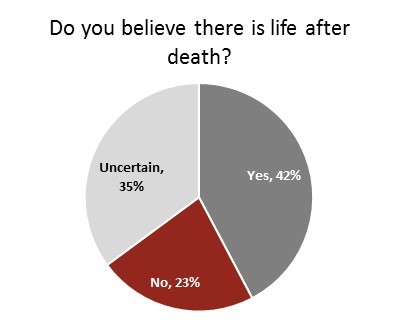Three-quarters of Canadians don’t completely dismiss the possibility of life after death

Two-in-five say they believe life goes on in some way after we die.
January 28, 2015 – Life after death may be regarded as an esoteric subject, but three-quarters of Canadians (77%) don’t dismiss that it could be a possibility.
This finding comes from an online, joint public opinion study of more than 1500 Canadians conducted by the Angus Reid Institute (ARI) and the University of Lethbridge.
Key Findings:
 Is there Life after Death?
Is there Life after Death?
- Two-in-five (42%) say they believe life continues in some way after we die
- One-third (35%) say they aren’t sure
- One-quarter (23%) say there is no life after death
These views differ across the Canadian population, with the highest numbers of afterlife believers tending to be residents of smaller provinces, women, people over the age of 35, and those with lower incomes and less formal education. The overall findings hold up over decades of inquiry into this question (see figure on next page).
What happens after we die?
A second question asked survey respondents: “What do you think happens to people after they die?”
There is uncertainty among respondents on this question, with one-in-three surveyed Canadians (36%) saying they “don’t know/can’t say”. Another one-in-four (24%) say “they simply stop existing”. This leaves one-in-four (25%) who believe people “go to heaven or some other good place”, while one-in-ten (9%) opt for “somewhere else”. The rest (7%) chose reincarnation as the most likely scenario.
Religious faith plays a role
 A relationship exists between views on this subject and the religious identity and behaviors of Canadians. That said, there is a notable lack of strong skepticism towards the subject (almost) across the board.
A relationship exists between views on this subject and the religious identity and behaviors of Canadians. That said, there is a notable lack of strong skepticism towards the subject (almost) across the board.
In terms of religious identity, members of Evangelical Protestant denominations express the highest levels of belief in life after death (78%).
This figure is roughly half among mainstream Protestants (55%), Roman Catholics (47%) and other non-Christians (53%).
However, religious identity alone does not tell the whole story: religious practice or attendance very much needs to be taken into account. Belief in life after death is reported by three-quarters (73%) of regular religious service attenders, defined as those attending once a month or more. The figure rises higher with more frequent attendance. Belief declines to roughly one-half (46%) of occasional religious service attenders, and down further to one-in-four (23%) among those who never attend religious services.
Those with no religious identity and non-attenders are considerably less likely to believe in life after death:
- 21 per cent among those with no religious identity
- 10 per cent among agnostics
- 6 percent among self-described atheists.
Still, the plurality among the two former groups characterize themselves as uncertain about life after death; whereas only among the atheist group does a full majority (66%) reject the notion.
While the tenets of other religions, notably Hinduism and Buddhism, do spell out life after death, for the Angus Reid Institute-University of Lethbridge survey, it was impossible to examine attitudes to the above questions among adherents to these faiths groups specifically due to small sample sizes.
Attitudes towards the afterlife and Physician-Assisted Suicide
A major Angus Reid Institute survey in December 2014 on physician-assisted suicide shows beliefs about this issue and life after death do interweave. Specifically, Canadians who believe in an afterlife are more reticent to endorse physician-assisted suicide, while those who don’t believe there is life after death are more supportive.

Other aspects
A previous study in early 2014 on this subject examined some additional aspects of the life after death question. The interested reader may find the full report here. Those findings include:
- Four-in-ten Canadians believe it is possible they will see departed loved ones again.
- And large numbers also believe in interaction with the deceased
- Half of Canadians surveyed said they think people who have died could still be aware of our lives
- Four-in-ten thought it is possible to communicate with the dead
- A similar number felt they have “been in touch” with someone who has died.
Click here for full report including tables and methodology
Click here for Questionnaire used in this survey
Image Credit: Brian Smithson/Flickr

